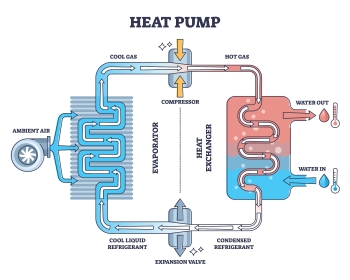If you've ever wondered how commercial heat pumps or domestic heat pump heating or DHW works and where the heat pump technology sources their heat from, you've come to the right place. In this article, we will delve into the science behind heat pumps and explore their heat sources.
Heat pumps are highly efficient heating and cooling systems that use a small amount of energy to transfer heat from one place to another. Unlike traditional heating systems that generate heat, heat pumps get their heat by extracting it from the air, ground, or water.
Domestic and commercial heat pumps extract heat from the outdoor air, even in cold temperatures, and transfer it into usable heat for heating for domestic hot water generation.
Understanding how domestic and commercial heat pumps work
Heat pumps work by utilizing a refrigeration cycle that consists of four main components: an evaporator, a compressor, a condenser, and an expansion valve. The process starts with the evaporator, which absorbs heat from the heat source, such as the air or the ground. The refrigerant in the evaporator evaporates, turning into a gas and absorbing the heat in the process.
The compressor then compresses the gas, increasing its temperature and pressure. This hot, pressurized gas then moves to the condenser, where it releases the heat it has absorbed. As the refrigerant cools down, it condenses back into a liquid state. Finally, the expansion valve reduces the pressure of the refrigerant, allowing it to return to the evaporator and start the cycle again.
Types of heat pumps
There are several types of heat pumps available, each with its own advantages and suitable heat sources. The most common types include domestic and commercial air-source heat pumps, ground-source heat pumps, and water-source heat pumps.
Domestic and commercial air-source heat pumps
Air-source heat pumps extract heat from the outdoor air, even in cold temperatures, and transfer it into usable heat. They work by utilizing a fan to draw air over the evaporator coil, which absorbs the heat from the air. This heat is then transferred to the refrigerant, which is pumped through the compressor and condenser.
Domestic and commercial Air-source heat pumps are popular due to their accessibility and relatively lower installation costs compared to other types of heat pumps. However, their efficiency may decrease in extremely cold climates.
Ground-source heat pump technology
Ground-source heat pumps utilize the stable temperature of the ground to extract heat. These heat pumps use a series of pipes, called loops, buried underground to circulate a heat transfer fluid, usually a mixture of water and glycol. The fluid absorbs heat from the ground and carries it to the heat pump, where it is transferred for usable heat.
Ground-source heat pumps are highly efficient and can provide both heating and cooling solutions. They are particularly beneficial in regions with extreme temperatures, as the ground temperature remains relatively stable throughout the year. However, installation costs can be higher due to the need for digging and laying the underground loops.
Water-source heat pumps
Water-source heat pumps extract heat from a water source, such as a lake, river, or well. They work similarly to ground-source heat pumps by circulating a heat transfer fluid through a series of pipes. The fluid absorbs heat from the water source and carries it to the heat pump.
Water-source heat pumps are highly efficient and can provide consistent heating and cooling. They are often used in areas with abundant water resources, such as coastal regions or near lakes and rivers. However, the availability and accessibility of a suitable water source may limit their applicability.
Comparison of heat sources for heat pumps
When deciding on a heat source for your domestic or commercial heat pump, it's essential to consider various factors, including efficiency, installation costs, and availability. Here's a comparison of the heat sources discussed above:
- Domestic and commercial air-source heat pumps: These are the most common and affordable option, but their efficiency may decrease in extremely cold climates.
- Ground-source heat pumps: These are highly efficient and suitable for extreme climates, but installation costs can be higher due to the need for underground loops.
- Water-source heat pumps: These are efficient and reliable, but the availability and accessibility of a suitable water source may limit their applicability.
Ultimately, the choice of heat source depends on your specific needs, geographical location, and budget.
Conclusion: The future of heat pumps and sustainable heating options.
Domestic and commercial heat pumps offer a sustainable and energy-efficient solution for heating buildings. By extracting heat from the air, ground, or water, they can provide renewable heat while reducing energy consumption and greenhouse gas emissions.
As technology advances and renewable energy sources become more accessible, the future of commercial heat pumps looks promising. With ongoing research and development, we can expect even greater efficiency, affordability, and sustainability in the coming years.
For more information and schematics on domestic hot water heat pump design, download our brochure today! (Please check the side bar) or visit our commerical heat pump page Commercial Heat Pump Technology :: Rinnai UK (rinnai-uk.co.uk)
We recognise that air source heat pump design is not a straightforward task especially when designing commercial heat pump systems, so we aim to take the pain out of the process with our design support, capital expenditure, operational expenditure and carbon modelling for a free consultation with our heat pump experts contact us today on 0300 373 0660 or Help me choose a product :: Rinnai UK (rinnai-uk.co.uk)
Useful resources:
Commercial Heat Pump Design Criteria - Courses | The CPD Certification Service (cpduk.co.uk)
